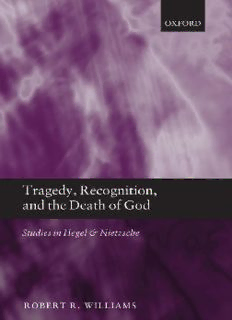Table Of ContentTragedy, Recognition, and the Death of God
This page intentionally left blank
Tragedy, Recognition,
and the Death of God
Studies in Hegel and Nietzsche
Robert R. Williams
1
3
GreatClarendonStreet,Oxford,OX26DP,
UnitedKingdom
OxfordUniversityPressisadepartmentoftheUniversityofOxford.
ItfurtherstheUniversity’sobjectiveofexcellenceinresearch,scholarship,
andeducationbypublishingworldwide.Oxfordisaregisteredtrademarkof
OxfordUniversityPressintheUKandincertainothercountries
#RobertR.Williams2012
Themoralrightsoftheauthorhavebeenasserted
FirstEditionpublishedin2012
Impression:1
Allrightsreserved.Nopartofthispublicationmaybereproduced,storedin
aretrievalsystem,ortransmitted,inanyformorbyanymeans,withoutthe
priorpermissioninwritingofOxfordUniversityPress,orasexpresslypermitted
bylaw,bylicenceorundertermsagreedwiththeappropriatereprographics
rightsorganization.Enquiriesconcerningreproductionoutsidethescopeofthe
aboveshouldbesenttotheRightsDepartment,OxfordUniversityPress,atthe
addressabove
Youmustnotcirculatethisworkinanyotherform
andyoumustimposethissameconditiononanyacquirer
BritishLibraryCataloguinginPublicationData
Dataavailable
LibraryofCongressCataloginginPublicationData
Dataavailable
ISBN978–0–19–965605–9
PrintedinGreatBritainby
MPGBooksGroup,BodminandKing’sLynn
LinkstothirdpartywebsitesareprovidedbyOxfordingoodfaithand
forinformationonly.Oxforddisclaimsanyresponsibilityforthematerials
containedinanythirdpartywebsitereferencedinthiswork.
For Irma, As Ever
This page intentionally left blank
Contents
AbbreviationsofFrequentlyCitedWorks x
Introduction 1
I. Recognition 6
II. Tragedy 8
III. TheKantianFrame 9
1. Hegel’sCriticismofKantandJacobi 10
2. CritiqueofFoundationalism:DecenteringtheSubject 12
3. Hegel’sTrueInfiniteasSocialInfinity:Panentheism 15
4. AContemporaryExpressionoftheFrame:Non-Metaphysical
ReadingsofHegel 16
5. OvercomingtheKantianFrame 21
IV. TheDeathofGodandTheodicyaftertheDeathofGod 26
V. Acknowledgments 29
Part I. Recognition
1. HegelandNietzsche:RecognitionandMaster/Slave 33
I. Hegel:RecognitionandMaster/Slave 34
II. Deleuze:NietzscheAnti-Hegel 38
III. RecognitionandRepresentation 40
IV. IsRecognitionInherentlyServile? 44
V. Genealogy,Hierarchy,andtheQuestionofCommunity 47
2. Aristotle,Hegel,andNietzscheonFriendship 54
I. AristotleonGreatnessofSoul(Megalopsychia) 58
II. AristotleonPhilia 63
III. LimitationsandQuestions 68
IV. Nietzsche:TwoViewsofFriendship 69
V. AnAgonicModelofFriendship? 73
VI. Hegel:Recognition,Friendship,SocialVirtues 77
VII. LoveandtheVirtues:Hegel’sEarlyTheologicalWritings 83
3. TheAgo¯n,Recognition,andtheQuestionofCommunity 87
I. TheAgo¯n 88
II. AffirmativeSocialOntologyinHuman,AllTooHuman 91
III. SocialOntologyinNietzsche’sLaterWritings 94
IV. TheTragicType:TransgressiveExperimentation 100
V. TheAgo¯nandtheWilltoPower 106
Part II. Tragedy
PhilosophyandTragedy 115
4. Hegel’sConceptionofTragedy 120
I. Fate,Love,andReconciliationintheEarlyTheologicalWritings 120
II. TragedyandDialectic 124
III. PreliminarySurveyofHegel’sConceptofTragedy 125
1. TheBackgroundAssumptionsofTragedy 126
2. Action 126
3. Resolution 127
IV. BackgroundoftheTragic:TheDivine–HumanEthicalOrder 127
V. Action 130
VI. TragicResolution 136
5. NietzscheonTragedy 143
I. TheTragicMyth 144
II. ApollinianandDionysianThemes 150
III. ThePhilosophical-ConceptualArticulationoftheTragicMyth 152
Part III. Overcoming the Kantian Frame: The True Infinite
6. Hegel’sConceptoftheTrueInfinite 161
I. TheTrueInfiniteAccordingtoWallace 167
II. TheTrueInfiniteCorrected:StephenHoulgate’sTheOpening
ofHegel’sLogic 171
III. TheTrueInfiniteandHegel’sTheology:Questions 173
IV. TheStubbornnessofFinitude:TheKantianFrame 175
V. CritiqueofKant’sPostulates:TheOught 177
VI. TheDialecticalSelf-SublationofFinitude 180
VII. Reversal:TheTrueInfiniteIncludestheFinite 183
VIII. SummaryandConclusion 185
7. Hegel’sRecastingofTheologicalProofs 190
I. Kant:TheGod-QuestionBothInevitableandImpossibletoAnswer 190
II. CritiqueofKant’sGodPostulateandAttackontheTheologicalProofs 192
III. Jacobi’sObjectionanditsContribution 197
IV. RecastingtheCosmologicalArgumentasAscentofSpirittoGod 203
V. TheOntologicalProof 206
1. Anselm’sArgument:ItsDefect 206
2. TheDifferenceandIdentityBetweenConceptandBeing 210
3. TheWoundofCognition 213
4. HealingtheWoundofCognition 215
5. BeingastheSelf-SpecificationoftheConcept 216
6. CulminationoftheAscent:TheSpeculativeReversal 219
VI. TheOntologicalProof,AbsoluteSpirit,andGod’sEthicalAseity 224
Part IV. God Beyond the Death of God
8. Theogenesis,DivineSuffering,DemythologizingtheDemonic 231
I. IljinonSpeculativeConcreteness 232
II. Hegel’sLogicasSpeculativeTheology 236
III. Hegel’sPanlogistPantheismandItsCrisis 240
IV. TowardsanEvaluationofIljin’sThesis 241
V. O’Regan’sandRicoeur’sTheogonicReadingsofHegel 244
VI. TheTragicCoincidenceofEvilwithFinitude:HumanImputability 247
VII. Hegel’sRejectionofTragicTheologyandTheogony 256
9. NietzscheontheDeathofGodandEternalRecurrence 263
I. LivingwithNihilism:Nietzsche’sTragicExperimentalism 264
II. Nietzsche’sTragicExperimentalismandIrony 269
III. EternalRecurrence 272
IV. TheIncoherenceofEternalRecurrence:KarlLo¨with 275
V. TheCoherenceofEternalRecurrence:WillDudley 277
VI. JoyousFatalism:NietzscheanReligionandTheology 283
10. HegelontheDeathofGod:TheInseparabilityofLoveandAnguish 290
I. Introduction 290
II. TheSuppressionofOthernessandTragedyinTraditional
PhilosophyandTheology 291
III. TheDeathofGodandDivineSuffering 296
IV. Theopassianism,Metaphysics,andOntotheology 302
V. TraditionalOntotheologyastheSubjectiveImpotenceofReason 304
VI. TheAppropriationofReconciliation 312
VII. Hegel’sCritiqueofModernity:TheSeparationofLovefromAnguish 314
11. Nietzsche’sAestheticTheodicy 322
I. Nietzsche’sAtheistTheodicyofThis-WorldRedemption 324
II. MichelHaar:TheodicyAftertheDeathofGod 326
III. Haar’sThreeNietzscheanTheodicies 330
IV. TheMetaphysicsoftheOne:ThereisaWhole 331
V. Anti-metaphysics:Nietzsche’sRecoilagainstIdentityandTotality 333
VI. TheTragicAbsolute:Heraclitus,Hegel,andNietzsche 335
VII. FinalQuestions 344
12. Hegel’sDeathofGodTheodicy 349
I. BeyondtheMoralGod:HarrisandIljinonHegel’sTheodicy 352
II. TheDeathofGodastheSpeculativeIntuition 358
III. TheologyandTragedy:RicoeurandHegelonJob 360
IV. WorldHistoryasCourtofWorldJudgment:Reconciliation
inHegel’sTheodicy 364
V. TheSlaughterhouse:DysteleologicalEvilandDivineConsolation 372
VI. TheAlienWorkofLove:HegelandTillichonDivineLoveandCreativity 378
SelectedBibliography 391
IndexofPersons 401
SubjectIndex 403
Description:Hegel and Nietzsche are two of the most important figures in philosophy and religion. Robert R. Williams challenges the view that they are mutually exclusive. He identifies four areas of convergence. First, Hegel and Nietzsche express and define modern interest in tragedy as a philosophical topic. E

